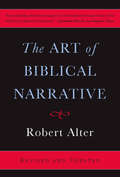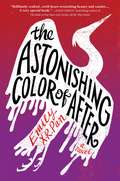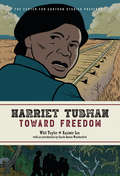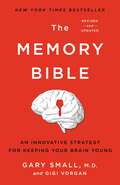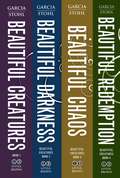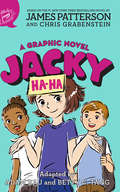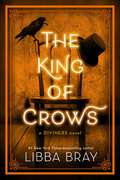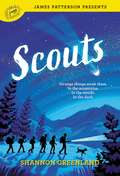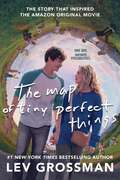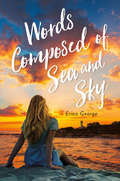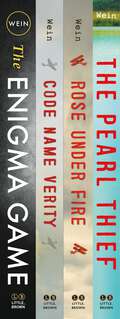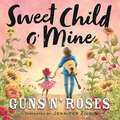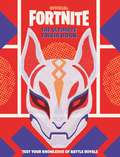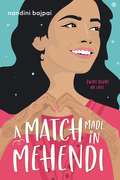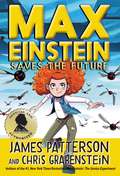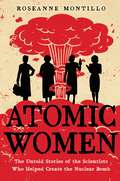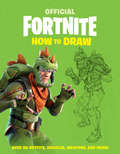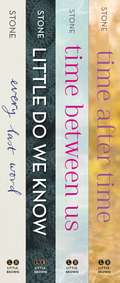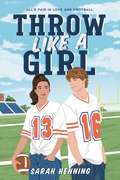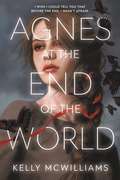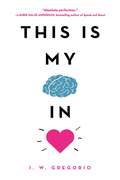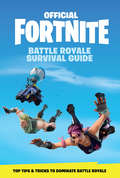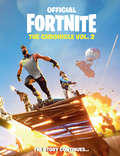- Table View
- List View
The Art of Biblical Narrative
by Robert AlterSince it was first published nearly three decades ago,The Art of Biblical Narrativehas radically expanded the horizons of biblical scholarship by recasting the Bible as a work of literary art deserving studied criticism. Renowned critic and translator Robert Alter presents the Hebrew Bible as a cohesive literary work, one whose many authors used innovative devices such as parallelism, contrastive dialogue, and narrative tempo to tell one of the most revolutionary stories of human history: the revelation of a single god.
The Astonishing Color of After
by Emily X.R. Pan<P> A stunning, heartbreaking debut novel about grief, love, and family, perfect for fans of Jandy Nelson and Celeste Ng. <P>Leigh Chen Sanders is absolutely certain about one thing: When her mother died by suicide, she turned into a bird. <P>Leigh, who is half Asian and half white, travels to Taiwan to meet her maternal grandparents for the first time. There, she is determined to find her mother, the bird. In her search, she winds up chasing after ghosts, uncovering family secrets, and forging a new relationship with her grandparents. And as she grieves, she must try to reconcile the fact that on the same day she kissed her best friend and longtime secret crush, Axel, her mother was taking her own life. <P><b>A New York Times Bestseller</b> <P>Alternating between real and magic, past and present, friendship and romance, hope and despair, The Astonishing Color of After is a stunning and heartbreaking novel about finding oneself through family history, art, grief, and love.
Harriet Tubman: The Center for Cartoon Studies Presents (The Center for Cartoon Studies Presents)
by Whit TaylorThis illuminating graphic novel biography about Harriet Tubman sheds new light on one of American history's bravest heroes.Harriet Tubman did something exceptionally courageous: She escaped slavery. Then she did something impossible: She went back. She underwent some thirteen missions to rescue around seventy enslaved people, using and expanding a network of abolitionists that became known as the Underground Railroad. She spent her life as an activist, speaking out for Black people and women's suffrage. This modern account of her trip to save her brothers is detailed and authentic. Illustrated with care for the historical record, it offers insight into the life and mind of Tubman, displaying her as a woman with an unshakable desire to break the chains of an unjust society. It is a perfect anti-racist narrative for our times and deepens an understanding of just what freedom means to those who must fight for it.
The Memory Bible: An Innovative Strategy for Keeping Your Brain Young
by Gary Small Gigi VorganClear, concise, prescriptive steps for improving memory loss and keeping the brain young—from one of the world's top memory experts.Everybody forgets things sometimes—from your keys to your lunch date to the name of an acquaintance. According to Dr. Gary Small, the director of the UCLA Center on Aging, much of this forgetfulness can be eliminated easily through his innovative memory exercises and brain fitness program—now available for the first time in a book. Using Small's recent scientific discoveries, The Memory Bible can immediately improve your mental performance. One of the ten commandments that Dr. Small has pioneered to improve your memory immediately is LOOK, SNAP, CONNECT:1: LOOK: actively observe what you want to learn2: SNAP: create a vivid snapshot and memorable image3: CONNECT: visualize a link to associate imagesIn addition, Dr. Small's comprehensive program includes a "brain diet" of memory-enhancing foods and a list of the most effective drugs, as well as a workbook with a weekly and daily calendar. Remember, as Dr. Small says, "Great memories are not born, they are made."
Beautiful Creatures Complete Gift Set (Beautiful Creatures)
by Kami Garcia Margaret StohlDiscover Kami Garcia and Margaret Stohl's epic bestselling Beautiful Creature series in this complete e-book collection that includes: Beautiful Creatures, Beautiful Darkness, Beautiful Chaos, Beautiful Redemption.There were no surprises in Gatlin County. At least, that's what I thought. Turns out, I couldn't have been more wrong.Ethan Wate used to think of Gatlin, the small Southern town he had always called home, as a place where nothing ever changed. Then he met mysterious newcomer Lena Duchannes, who revealed a secret world where a curse has marked Lena's family of powerful Supernaturals for generations.Mysterious, suspenseful, and romantic, Beautiful Creatures, Beautiful Darkness, Beautiful Chaos, and Beautiful Redemption introduce a secret world hidden in plain sight. A world where impossible, magical, life-altering events happen. Sometimes life-ending.
Jacky Ha-Ha: A Graphic Novel (Jacky Ha-Ha #1)
by James Patterson Chris GrabensteinAdapted from James Patterson's #1 bestselling story, this hilarious and heartwarming graphic novel introduces Jacky Ha-Ha, a class clown who makes people laugh with her so they can't laugh at her!With her irresistible urge to tell a joke in every situation--even when it's a bad idea--Jacky Ha-Ha loves to make people laugh. And cracking wise helps distract her from thinking about not-so-funny things in her life, like her mom serving in a dangerous, faraway war, and a dad who's hardly ever home. But no matter how much fun Jacky has, she can't entirely escape her worries. So one starlit night, she makes a promise to keep her family together...even if she has to give up the one thing that makes her happy. But can she stop being Jacky Ha-Ha, if that's who she really is?Bright, funny, and fast-paced artwork will have readers laughing their way through Jacky's ha-ha-heartwarming story!
Sister of the Bollywood Bride
by Nandini BajpaiFor fans of Morgan Matson's Save the Date comes a charming novel about one teen's summer tackling disasters including, but not limited to, family, romance, and weather—as she plans her sister's Bollywood-style Indian wedding.Mini's big sister, Vinnie, is getting married. Their mom passed away seven years ago and between Dad's new start-up and Vinnie's medical residency, there's no one but Mini to plan the wedding. Dad raised her to know more about computers, calculus, and cars than desi weddings but from the moment Mini held the jewelry Mom left them, she wanted her sister to have the wedding Mom would've planned.Now Mini has only two months to get it done and she's not going to let anything distract her, not even the persistent, mysterious, and smoking-hot Vir Mirchandani. Flower garlands, decorations, music, even a white wedding horse—everything is in place.That is, until a monster hurricane heads for Boston that could ruin everything. Will Mini come through as sister of the bride and save the day?
The King of Crows: Number 4 In The Diviners Series (The Diviners #4)
by Libba Brayp.p1 {margin: 0.0px 0.0px 0.0px 0.0px; font: 13.0px Times; color: #000000} span.s1 {font-kerning: none} The breath-taking finale to the epic New York Times bestseller, The Diviners, from Printz winner and beloved author, Libba Bray. After the horrifying explosion that claimed one of their own, the Diviners find themselves wanted by the US government, and on the brink of war with the King of Crows. While Memphis and Isaiah run for their lives from the mysterious Shadow Men, Isaiah receives a startling vision of a girl, Sarah Beth Olson, who could shift the balance in their struggle for peace. Sarah Beth says she knows how to stop the King of Crows-but, she will need the Diviners' help to do it. Elsewhere, Jericho has returned after his escape from Jake Marlowe's estate, where he has learned the shocking truth behind the King of Crow's plans. Now, the Diviners must travel to Bountiful, Nebraska, in hopes of joining forces with Sarah Beth and to stop the King of Crows and his army of the dead forever. But as rumors of towns becoming ghost towns and the dead developing unprecedented powers begin to surface, all hope seems to be lost. In this sweeping finale, The Diviners will be forced to confront their greatest fears and learn to rely on one another if they hope to save the nation, and world from catastrophe...
Scouts
by James Patterson Shannon GreenlandStranger Things meets The Goonies in this suspenseful yet heartwarming adventure story about a group of friends who set out to find a crashed meteor...but find mystery and danger instead as their close relationships begin to fracture.Annie, Beans, Rocky, and Fynn are the Scouts--best friends who do everything together. It's 1985, and the summer before seventh grade is just beginning. The Scouts decide to secretly climb Old Man Basinger's silo to watch a meteor shower, and when one meteor seems to crash nearby, the Scouts know they have to set out on their next adventure and find it. But their fun overnight jaunt through the woods soon takes a turn for the worst when they discover a series of disturbing clues about the meteor--and suddenly find themselves on the run from the wild, violent Mason clan. Bonds are tested when new kids join their adventure and the group's true feelings are revealed. Will the Scouts survive this journey together--or will their unbreakable friendships prove vulnerable after all?
The Map of Tiny Perfect Things
by Lev GrossmanFrom #1 New York Times bestselling author Lev Grossman comes a magical-realist romance that turns the Groundhog Day premise inside-out and upside-down—coming soon to Amazon as a major motion picture.Mark is 17-years-old and trapped in a time loop, and that&’s just fine with him. It&’s summertime and he&’s spending this one infinitely repeating day reading his way through the town library. Then he discovers someone else in the loop with him: the brilliant, haunted Margaret. Together Mark and Margaret set out to find every wonderful, amazing, perfect thing that happens in that one day—a journey that will take them to the dark secret that waits at the very heart of their endless day. Thrilling, funny, and deeply romantic, this novella is perfect for fans of John Green, Nicola Yoon, and Jandy Nelson.
Words Composed of Sea and Sky
by Erica GeorgeThis modern summer romance set on Cape Cod features two young adult poets divided by centuries. Michaela Dunn, living on present day Cape Cod, dreams of getting into an art school, something her family just doesn't understand. When her stepfather refuses to fund a trip for a poetry workshop, Michaela finds the answer in a local contest searching for a poet to write the dedication plaque for a statue honoring Captain Benjamin Churchill, a whaler who died at sea 100 years ago.She struggles to understand why her town venerates Churchill, an almost mythical figure whose name adorns the school team and various tourist traps. When she discovers the 1862 diary of Leta Townsend, however, she gets a glimpse of Churchill that she didn't quite anticipate. In 1862, Leta Townsend writes poetry under the name Benjamin Churchill, a boy who left for sea to hunt whales. Leta is astonished when Captain Churchill returns after his rumored death. She quickly falls for him. But is she falling for the actual captain or the boy she constructed in her imagination?
Code Name Verity Collection
by Elizabeth WeinDiscover all four critically-acclaimed, award-winning novels set in the world of the #1 New York Times bestseller Code Name VerityIn The Enigma Game, fifteen-year-old Louisa Adair wants to fight back, make a difference, do something--anything to escape the Blitz and the ghosts of her parents, who were killed by enemy action. But when she accepts a position in the small village of Windyedge, Scotland, it hardly seems like a meaningful contribution. Still, the war feels closer than ever in Windyedge, where Ellen McEwen, a volunteer driver with the Royal Air Force, and Jamie Beaufort-Stuart, a flight leader for the 648 Squadron, are facing a barrage of unbreakable code and enemy attacks they can't anticipate. Their paths converge when a German pilot lands in Windyedge under mysterious circumstances and plants a key that leads Louisa to an unparalleled discovery: an Enigma machine that translates German code. Louisa, Ellen, and Jamie must work together to unravel a puzzle that could turn the tide of the war--but doing so will put them directly in the cross-hairs of the enemy.In the #1 New York Times bestseller Code Name Verity, a British spy plane crashes in Nazi-occupied France on October 11th, 1943. Its pilot and passenger are best friends. One of the girls has a chance at survival. The other has lost the game before it's barely begun. When "Verity" is arrested by the Gestapo, she's sure she doesn't stand a chance. As a secret agent captured in enemy territory, she's living a spy's worst nightmare. Her Nazi interrogators give her a simple choice: reveal her mission or face a grisly execution. As she intricately weaves her confession, Verity uncovers her past, how she became friends with the pilot Maddie, and why she left Maddie in the wrecked fuselage of their plane. On each new scrap of paper, Verity battles for her life, confronting her views on courage, failure and her desperate hope to make it home. But will trading her secrets be enough to save her from the enemy?In Rose Under Fire, American ATA pilot and amateur poet, Rose Justice, is captured by the Nazis while flying an Allied fighter plane from Paris to England. She is sent to Ravensbruck, the notorious women's concentration camp. Trapped in horrific circumstances, Rose finds hope in impossible circumstances through the loyalty, bravery and friendship of her fellow prisoners. But will that be enough to endure the fate that's in store for her?In The Pearl Thief, fifteen-year-old Julia Beaufort-Stuart wakes up in the hospital, instantly realizing that the lazy summer break she'd imagined won't be exactly what she anticipated. And once she returns to her grandfather's estate, she begins to realize that her injury might not have been an accident. One of her family's employees is missing, and he disappeared on the very same day she landed in the hospital. Desperate to figure out what happened, she befriends Euan McEwen, a Scottish Traveler boy, and his standoffish sister, Ellen. As Julie grows closer to this family, her memory of that fateful day returns to her in pieces. And when a body is discovered, her new friends are caught in the crosshairs of long-held biases about Travelers and Julie must get to the bottom of the mystery in order to keep them from being framed for the crime.
Sweet Child o' Mine
by Guns N' RosesCelebrate music, family, and childhood with this sweet illustrated adaptation of the classic Guns N' Roses song.She's got a smile that it seems to meReminds me of childhood memories . . .Iconic band Guns N' Roses gives new meaning to the beloved lyrics from "Sweet Child O' Mine" in this vivid, heartfelt picture book. Follow a child's wondrous discovery that music is everywhere around us -- from the gentle wind blowing through the bluest skies, to the fearful crash of the thunder and the rain.With Jennifer Zivoin's evocative, sweeping paintings, Sweet Child O' Mine celebrates love and music, and how they bring us together in the sweetest ways.
FORTNITE (Official): The Ultimate Trivia Book
by Epic GamesAre you a true Fortnite expert? Find out in this official Epic Games trivia book, featuring the authentic Fortnite holographic seal.Packed with hundreds of quiz questions in five different levels of difficulty, this official trivia book from Epic Games is jam-packed with Battle Royale brainteasers to test your Fortnite expertise. Whether you're new to the game or an old hand, these questions will level up your knowledge and provide hours of fun. Are you up for the challenge? Your trivia test starts here!
A Match Made in Mehendi
by Nandini Bajpaip.p1 {margin: 0.0px 0.0px 0.0px 0.0px; font: 13.0px Times} p.p2 {margin: 0.0px 0.0px 0.0px 0.0px; font: 13.0px Times; min-height: 16.0px} For fans of When Dimple Met Rishi comes a lighthearted novel about tradition, high school social hierarchy, matchmaking, and swiping right (or left!). Fifteen-year-old Simran "Simi" Sangha comes from a long line of Indian vichole -- matchmakers -- with a rich history for helping parents find good matches for their grown children. When Simi accidentally sets up her cousin and a soon-to-be lawyer, her family is thrilled that she has the "gift." But Simi is an artist, and she doesn't want to have anything to do with relationships, helicopter parents, and family drama. That is, until she realizes this might be just the thing to improve her and her best friend Noah's social status. Armed with her family's ancient guide to finding love, Simi starts a matchmaking service-via an app, of course. But when she helps connect a wallflower of a girl with the star of the boys' soccer team, she turns the high school hierarchy topsy-turvy, soon making herself public enemy number one.
Max Einstein: Saves the Future (Max Einstein #3)
by James Patterson Chris GrabensteinThe world's #1 bestselling author has teamed up with the world's most famous genius to entertain, educate and inspire a generation of kids--with the first and only kids' book series officially approved by the Albert Einstein Archives.Albert Einstein + James Patterson = A Must Read! Max is back with a thrilling new adventure that involves time travel, creepy bad guys, killer drones, and a shocking mystery about her past that she will stop at nothing to solve! Under constant danger of being kidnapped by the shadowy Corporation, Max is on the run from New York to London and beyond. But soon the call comes for the Change Maker kids' next mission: make sure no kid ever goes hungry again! If anyone can tackle a problem this big, Max and her genius friends can. But mysterious clues about her past keep distracting Max's focus. She always wanted to know who her parents were and why they abandoned her as a baby. If she manages to build a time machine, she could find them and get all the answers! What's more important - her past, or the future of the Change Makers?
Atomic Women: The Untold Stories of the Scientists Who Helped Create the Nuclear Bomb
by Roseanne MontilloBomb meets Code Girls in this nonfiction narrative about the little-known female scientists who were critical to the invention of the atomic bomb during World War II.They were leaning over the edge of the unknown and afraid of what they would discover there: Meet the World War II female scientists who worked in the secret sites of the Manhattan Project. Recruited not only from labs and universities from across the United States but also from countries abroad, these scientists helped in -- and often initiated -- the development of the atomic bomb, taking starring roles in the Manhattan Project. In fact, their involvement was critical to its success, though many of them were not fully aware of the consequences.The atomic women include:Lise Meitner and Irène Joliot-Curie (daughter of Marie Curie), who led the groundwork for the Manhattan Project from Europe;Elizabeth Rona, the foremost expert in plutonium, who gave rise to the "Fat Man" and "Little Boy," the bombs dropped over Japan;Leona Woods, Elizabeth Graves, and Joan Hinton, who were inspired by European scientific ideals but carved their own paths.This book explores not just the critical steps toward the creation of a successful nuclear bomb, but also the moral implications of such an invention. p.p1 {margin: 0.0px 0.0px 0.0px 0.0px; font: 13.0px Times}
FORTNITE (Official Fortnite Books)
by Epic GamesDraw your favorite Outfits, vehicles, weapons, and more with Epic Games' first official how to draw book, including tips to make your sketches as epic as your in-game achievements and featuring the authentic Fortnite holographic seal.Learn how to draw 35 of the game's most popular icons-including Outfits, weapons, building materials, and vehicles. In easy-to-follow stages, you'll go step-by-step from rough sketch to detailed finish.INCLUDES:16 iconic Outfits8 fearsome weaponsThe craziest in-game vehiclesDrawing guideTop art tips, including advanced shading and texture techniquesWhether you're a complete novice or an experienced artist, this book will inspire you to pick up a pencil and get sketching! LET'S GO!
Tamara Ireland Stone Collection
by Tamara Ireland StoneDiscover four critically-acclaimed novels from award-winning author Tamara Ireland Stone, including the New York Times bestseller Every Last Word.In the New York Times bestselling Every Last Word, Samantha McAllister looks just like the rest of the popular girls in her junior class. But she&’s hiding a secret that her friends would never understand: Sam has Purely-Obsessional OCD and is consumed by a stream of dark thoughts and worries that she can't turn off. It doesn't help that her lifelong friends will turn toxic at the first sign of a wrong outfit, wrong lunch, or wrong crush. So when Sam meets Caroline, she has to keep her new friend a secret, right up there with Sam's weekly visits to her psychiatrist. But then Caroline introduces Sam to Poet's Corner, a tight-knit group of misfits who have been ignored by the school at large. Sam is drawn to them immediately, especially a guitar-playing guy with a talent for verse. Slowly, she begins to feel more "normal" than she ever has as part of the popular crowd . . . until she finds a new reason to question her sanity and all she holds dear.In Little Do We Know, lifelong best friends and next-door neighbors Hannah and Emory have never gone a single day without talking. But now it&’s senior year and they haven't spoken in three months. Not since the fight, where they each said things they couldn't take back. Then one fateful night, Emory's boyfriend, Luke, almost dies, and Hannah is the one who finds him and saves his life. As Luke tries to make sense of his experience, he secretly turns to Hannah, who becomes his biggest confidante. And in Luke, Hannah finds someone she can finally talk to. But Emory just wants everything to go back to normal—the way it was before the accident. But when the horrifying reason behind Hannah and Emory's argument ultimately comes to light, all three of them will be forced work together to protect the one with the biggest secret of all in this deeply moving, unforgettable story about love, betrayal, and the power of friendship.In Time Between Us, Anna and Bennett were never supposed to meet. She lives in 1995 Chicago and he lives in 2012 San Francisco. But Bennett's unique ability to travel through time and space brings him into Anna's life, and with him, a new world of adventure and possibility. As their relationship deepens, they face the reality that time might knock Bennett back where he belongs, even as a devastating crisis throws everything they believe into question. Against a ticking clock, Anna and Bennett are forced to ask themselves how far they can push the bounds of fate—and what consequences they can bear in order to stay together.In the sequel to Time Between Us, Time After Time, Anna and Bennett have found a way to stay together against all odds. It&’s not a perfect arrangement, though, with Bennett unable to stay in the past for more than brief visits, skipping out on big chunks of his present in order to be with Anna. They each are confident that they&’ll find a way to make things work…until Bennett witnesses a single event he never should have seen. Will the decisions he makes from that point on cement a future he doesn&’t want?
Throw Like a Girl
by Sarah HenningFriday Night Lights meets Morgan Matson's The Unexpected Everything in this contemporary debut where swoonworthy romance meets underdog sports story. When softball star Liv Rodinsky throws one ill-advised punch during the most important game of the year, she loses her scholarship to her fancy private school, her boyfriend, and her teammates all in one fell swoop. With no other options, Liv is forced to transfer to the nearest public school, Northland, where she'll have to convince its coach she deserves a spot on the softball team, all while facing both her ex and the teammates of the girl she punched... Every. Single. Day. Enter Grey, the injured star quarterback with amazing hair and a foolproof plan: if Liv joins the football team as his temporary replacement, he'll make sure she gets a spot on the softball team in the spring. But it will take more than just a flawless spiral for Liv to find acceptance in Northland's halls, and behind that charismatic smile, Grey may not be so perfect after all.With well-drawn characters and a charming quarterback love interest who's got brains as well as brawn, Throw Like a Girl will have readers swooning from the very first page.
Agnes at the End of the World
by Kelly McWilliamsThe Handmaid's Tale meets Wilder Girls in this genre-defying novel about a girl who escapes a terrifying cult only to discover that the world Outside has succumbed to a viral apocalypse.Agnes loves her home of Red Creek -- its quiet, sunny mornings, its dusty roads, and its God. There, she cares tirelessly for her younger siblings and follows the town's strict laws. What she doesn't know is that Red Creek is a cult, controlled by a madman who calls himself a prophet.Then Agnes meets Danny, an Outsider boy, and begins to question what is and isn't a sin. Her younger brother, Ezekiel, will die without the insulin she barters for once a month, even though medicine is considered outlawed. Is she a sinner for saving him? Is her sister, Beth, a sinner for dreaming of the world beyond Red Creek?As the Prophet grows more dangerous, Agnes realizes she must escape with Ezekiel and leave everyone else, including Beth, behind. But it isn't safe Outside, either: A viral pandemic is burning through the population at a terrifying rate. As Agnes ventures forth, a mysterious connection grows between her and the Virus. But in a world where faith, miracles, and cruelty have long been indistinguishable, will Agnes be able to choose between saving her family and saving the world? p.p1 {margin: 0.0px 0.0px 0.0px 0.0px; font: 13.0px Times} p.p2 {margin: 0.0px 0.0px 0.0px 0.0px; font: 13.0px Times; min-height: 16.0px}
This Is My Brain in Love
by I. W. GregorioTold in dual narrative, This Is My Brain in Love is a stunning YA contemporary romance, exploring mental health, race and, ultimately, self-acceptance, for fans of I Am Not Your Perfect Mexican Daughter and Emergency Contact. p.p1 {margin: 0.0px 0.0px 12.0px 0.0px; line-height: 14.0px; font: 13.0px Times; color: #000000; -webkit-text-stroke: #000000} span.s1 {font-kerning: none} Jocelyn Wu has just three wishes for her junior year: To make it through without dying of boredom, to direct a short film with her BFF Priya Venkatram, and to get at least two months into the year without being compared to or confused with Peggy Chang, the only other Chinese girl in her grade.Will Domenici has two goals: to find a paying summer internship, and to prove he has what it takes to become an editor on his school paper. Then Jocelyn's father tells her their family restaurant may be going under, and all wishes are off. Because her dad has the marketing skills of a dumpling, it's up to Jocelyn and her unlikely new employee, Will, to bring A-Plus Chinese Garden into the 21st century (or, at least, to Facebook).What starts off as a rocky partnership soon grows into something more. But family prejudices and the uncertain future of A-Plus threaten to keep Will and Jocelyn apart. It will take everything they have and more, to save the family restaurant and their budding romance.
FORTNITE: Battle Royale Survival Guide (Official Fortnite Bks.)
by Epic GamesThe OFFICIAL Battle Royale Survival Guide from Epic Games, the creators of FORTNITE, the BIGGEST gaming brand in the world. This full-color handbook includes all the top tips and tricks you'll need to dominate Battle Royale! From basic gameplay to more advanced maneuvers, this handbook lists all the essential tips and tricks you need to become the last player standing. Immerse yourself in island walk-throughs, weapon rundowns, combat hacks, building guides, team tactics, and more. Featuring: FULL ISLAND GUIDEAll the key places to land and loot--and how to get around the island with ease. SNEAKY SURVIVAL TACTICSSmart ways to use the Storm to your benefit, top tips for building your way out of trouble, and the outfit options that offer the best camouflage. HOW TO FIGHT BETTER AND SMARTERCrazy and creative ideas for using game elements to your advantage, whether playing solo or in a team.
Heist Society Collection
by Ally CarterKat Bishop can steal anything—including your heart. Read all three books in the New York Times bestselling Heist Society series, filled with intrigue, adventure, romance, and charm.In Heist Society, Katarina has been a part of the family business—thieving—for as long as she can remember. When Kat tries to leave "the life" for a normal life, her old friend Hale conspires to bring her back into the fold. Why? A mobster's art collection has been stolen, and Kat's father is the only suspect. Caught between Interpol and a far more deadly enemy, Kat's dad needs her help. The only solution is to find the paintings and steal them back. Kat's got two weeks, a teenage crew, and hopefully enough talent to pull off the biggest heist in her family's history—and, with any luck, steal her life back along the way.In Uncommon Criminals, Katarina Bishop has worn a lot of labels in her short life. Friend. Niece. Daughter. Thief. But for the last two months she's simply been known as the girl who robbed the greatest museum in the world. That's why Kat isn't surprised when she's asked to steal the infamous Cleopatra Emerald so it can be returned to its rightful owners. There are only three problems. First, the gem is owned by the most secure auction house in the world. Second, since the fall of the Egyptian empire and the suicide of Cleopatra, no one who holds the emerald keeps it for long, and in Kat's world, history almost always repeats itself. But it's the third problem that makes Kat's crew the most nervous: the emerald is cursed. Kat might be in way over her head, but she's not going down without a fight. After all she has her best friend—the gorgeous Hale—and the rest of her intrepid crew with her as they chase the Cleopatra Emerald around the world, realizing that the same tricks and cons her family has used for centuries are useless this time. Which just means that Katarina Bishop is going to have to make up her own rules.In Perfect Scandals,it&’s clear that Katarina Bishop and W.W. Hale the fifth were born to lead completely different lives. Kat comes from a long, proud line of loveable criminal masterminds, while Hale is the scion of one of the most seemingly perfect dynasties in the world. If their families have one thing in common, it's that they both know how to stay under the radar while getting—or stealing—whatever they want. No matter the risk, the Bishops can always be counted on, but in Hale's family, all bets are off when money is on the line. When Hale unexpectedly inherits his grandmother's billion-dollar corporation, he quickly learns that there's no place for Kat in his new role. But Kat won't let him go that easily, especially after she gets tipped off that his grandmother's will might have been altered in an elaborate con to steal the company's fortune. So instead of being the heir, this time Hale might be the mark. Forced to keep a level head as she and her crew fight for one of their own, Kat is prepared to do the impossible, but first, she has to decide if she's willing to save her boyfriend's company even if it means losing the boy.
FORTNITE (Official Fortnite Books)
by Epic GamesCelebrate all the wildest highlights from Fortnite's latest seasons in this official Epic Games' book, featuring the authentic Fortnite holographic seal.Fortnite has seen another year of incredible changes, starting with a huge asteroid blowing up the map to mark the launch of Chapter 2! Now you can follow all the twists and turns of the last 12 months--including the first Fortnite World Cup--in this official yearbook from Epic Games. Relive your favorite moments from Battle Royale and test your knowledge of seasons past!
